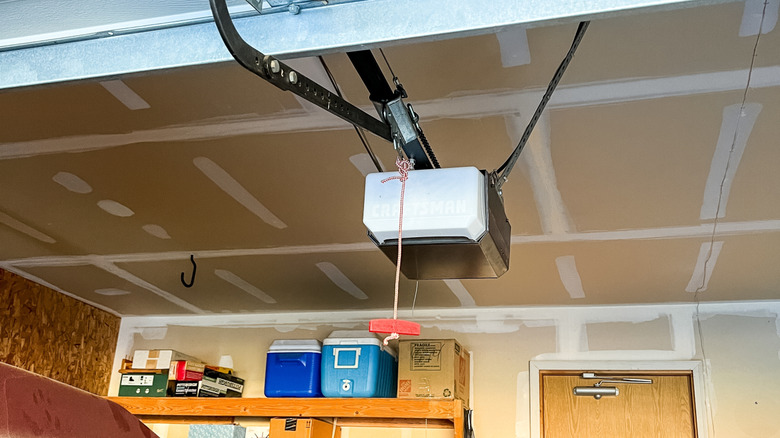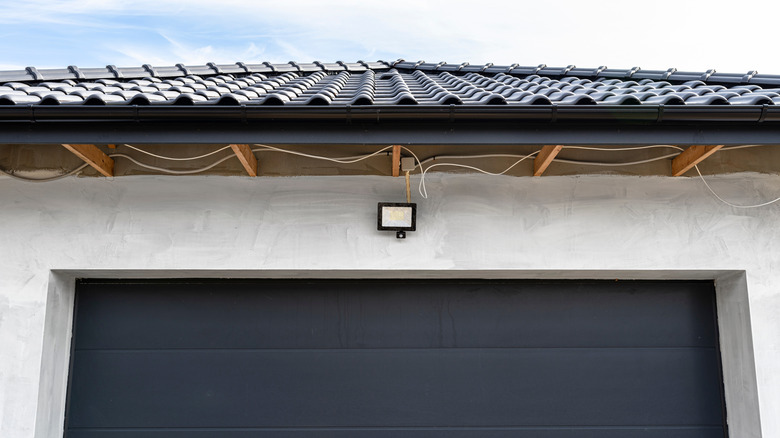Why You Should Think Twice Before Putting A Zip Tie On Your Garage Door
We may receive a commission on purchases made from links.
You likely have a long list of things to worry about when it comes to protecting your home from intruders, and your garage is probably one of them. Of all of the spots in a house, thieves often target garages due to the easy access they offer. You may have seen the infamous YouTube video that shows how effortless it is to open a garage door by pulling the emergency release cord with a coat hanger. You may have also come across social media posts showing the "zip tie hack," which makes the emergency release feature inoperable and thus denies burglars this means of entry.
But while this "hack" does create a barrier for hanger-armed burglars who wish to disengage the emergency release latch, it comes with a number of downsides. For one, the zip tie deactivates a vital, legally mandated safety feature and creates unsafe conditions in your home. Likewise, interfering with the release cord can void the garage door's manufacturer's warranty, leaving you on the hook for any repairs if the door breaks. And here's the kicker: Apart from the viral YouTube video, which has certainly gained a high number of views, there isn't a single recorded instance of a burglar breaking into a garage using this coat hanger method. The purported benefits of the viral zip tie hack simply do not outweigh the risks. The good news is that there are plenty of safe, effective ways to protect a garage door from unauthorized entry.
How the zip tie trick works — and why it's not worth trying
The zip tie hack is simple. You push a zip tie through both holes in the emergency release cord latch. This way, the latch is firmly shut, and burglars have no way of pulling it open with a coat hanger.
But while the zip tie trick offers an easy way to keep burglars out, it effectively disables the emergency release. In practical terms, this means that you no longer have a safety feature that would quickly give you manual control of the garage door should the automatic opener malfunction. For example, if the door is about to slam close on a child, pet, or object who's in the way, and the automatic opener is not functioning properly, you'll have to waste precious time cutting the zip tie before being able to operate the door manually and addressing the emergency. Likewise, if the automatic opener is refusing to open the door, you won't be able to operate it freely as long as that zip tie is in place. That's not a great scenario if your house is on fire and your only escape route is out the garage.
There is another reason to steer clear of the zip tie trick. Per Title 16, Section 1211.9 of the Code of Federal Regulations, residential garage doors must be equipped with a working release feature. By disabling the emergency release, you make the device non-compliant with federal law. If the door breaks, you may now not be able to get coverage under its manufacturer's warranty.
Better strategies for protecting your garage from burglars
There are better strategies for protecting your garage door from break-ins. For one, there are protective plates, like this one from GarageShield, that are specifically designed to block outside access to the emergency release latch without disabling the latter. If the door has windows, consider covering them with window film so that thieves cannot see what you have stored inside. Obscuring the garage door windows will also keep the burglars from finding the location of the emergency release latch.
An effective way to discourage burglars from trying to break into your garage is to use motion sensor lights. These will flood the driveway with light any time someone — including a burglar — is in the area. Being highly visible while attempting a break in is an unappealing prospect to most burglars — one that makes your garage less of an attractive target.
Finally, you may want to install a security system, along with cameras, to monitor and capture all activity outside of your garage. Hopefully, this will further deter criminals from targeting your home. However, if they do break in, the security company will quickly respond, and you'll have footage of the crime to share with law enforcement officials.


